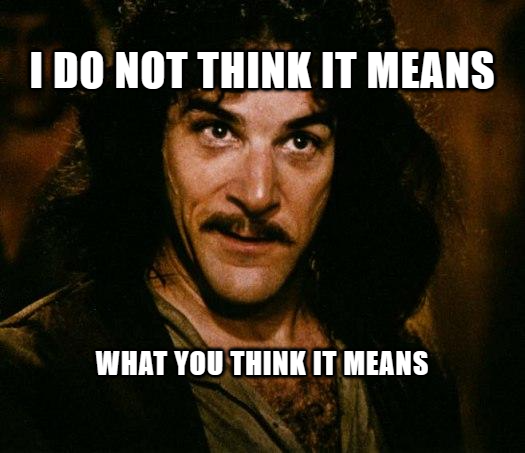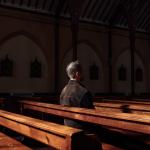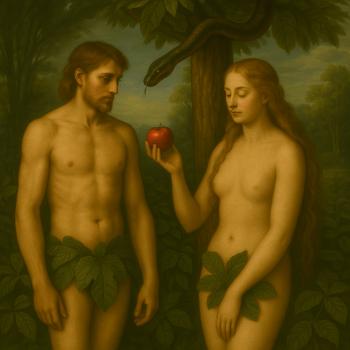Spiritual inquiry requires open-heartedness and open-mindedness.

My work is more reporting than apologetics or polemics. In my speaking and writing, I ask a lot of questions, and I leave a lot of room for differing interpretations and varying worldviews. Realizing that all religion is cultural and that all theology is speculation, I know one thing, namely that everyone is related, and everything is connected. I do NOT believe too many things.
Most people are asking questions themselves, and many seekers appreciate different interpretations and tolerate varying worldviews. Nobody knows the answers to the big questions.
Still, I hear often from militant atheists who say things like, “Get off the fence. You know that God does NOT exist and that spirituality is NOT productive. It’s all speculation and woo-woo stuff.” Honestly, if I knew that God did NOT exist, I would say so. For what it’s worth, I reject the same concept of God and the same speculative stuff and woo-woo that you reject.
Also, I hear often from militant theists who say things like, “Get off the fence. You know that God exists and that spirituality is the most productive thing that we can do. It’s factual, not fictional.” Honestly, if I knew that God exists, I would say so. For what it’s worth, I’m a deeply spiritual person. At the same time, I’m agnostic about most things, because NONE of this stuff is factual.
When I say that NONE of this stuff is factual, I do NOT mean that there is no such thing as Truth with a capital T. Of course, there are answers to the big questions; we just can NOT know them. That being the case, we should be honest enough with ourselves and others to characterize our positions as beliefs, not facts.
“I Do Not Think It Means What You Think It Means.”
In the famous line from the film The Princess Bride, swordsman Inigo Montoya utters the memorable line, “You keep using that word. I do not think it means what you think it means.”
In The Way, I quote The Red Book by psychologist Carl Jung. Jung asks Ammonius the Anchorite how he can read the Bible so many times without encountering monotony. The monk replies:
“A succession of words does not have only one meaning, but men strive to assign only a simple meaning to the sequence of words, in order to have an unambiguous language.… What you call ‘knowledge’ is an attempt to impose something comprehensible on life.… The word becomes your God, since it protects you from the possibilities of interpretation.… I’ve spent many years with the process of unlearning. Have you ever unlearned anything?”
Everyone thinks that they are reasonable, that reasonable people agree with them, and that their views are normative. We all assume that we mean the same thing when we use the same words. But what do we mean by words like “God,” “mysticism” or “spirituality”? (For that matter, what do we mean by words like “consciousness,” “energy” or “experience”?)
I use the term “Ultimate Reality,” which is found in the Eastern religions, to describe the indescribable. It is a placeholder for “what is,” irrespective of personal beliefs and speculative theories. Ultimate Reality is a neutral term, which is NOT necessarily personal and NOT necessarily supernatural. Am I an atheist or a theist? If we can define the terms, then I can answer the question.
If you believe in the God of the Bible, can you consider that Ultimate Reality might be larger and more mysterious than any narrow, specific, tribal description of the Indescribable, even yours?
I define “spirituality” as the belief in something greater than ourselves. I define “mysticism” as the way to access that something greater than ourselves. There is nothing inherently personal or supernatural about either of these definitions.
If you do NOT believe in spirituality, can you consider that it might NOT be personal (or even religious) that it focuses on an Ultimate Reality that might NOT be supernatural, but natural?
“Don’t Fall for the Binary Trap.”
Jim Palmer, a friend and mentor who wrote the foreword to my book, wrote about the false binary choices that come up in religious deconstruction here. Jim writes:
“Binary thinking, by definition, is thinking there are two sides, and you can only pick one. Also known as dichotomous thinking, this way of thinking becomes simple for us to process complex ideas and situations. The gray area in the middle of these complex issues is often ignored or goes unnoticed.
“There are a lot of false choices that come up in religious deconstruction. Here are a few:
- False Choice #1: The God of Christian fundamentalism (Christian Theism) OR no God at all (Atheism)
- False Choice #2: The Bible as the infallible and inerrant word spoken by God for all humankind OR the Bible is trash and worthless
- False Choice #3: Jesus as the divine Son of God, bodily raised from the dead and at the right hand of God in heaven OR Jesus didn’t exist
- False Choice #4: Religion as toxic fundamentalism OR all religion is worthless
“This binary thinking is not critical thinking, and often leads to the kind of fundamentalism I mentioned previously. The post-religion spiritual landscape is diverse, complex and nuanced.”
When I ask open-ended questions, I am NOT trying to complicate things or to straddle the fence. I am trying to suggest that these issues are diverse, complex and nuanced, as Jim Palmer writes. At the same time, I am suggesting that the world would be a better place if more people approached life in an open-hearted and open-minded way, rather than staking out extreme positions.
Spiritual inquiry requires open-heartedness and open-mindedness.
If you want to keep up with the latest from You Might Be Right, please subscribe.
The Way is a Silver winner in the 2024 Nautilus Book Awards.
If you enjoyed this article, please leave a comment at the bottom of this page.
Thanks for reading You Might Be Right!!














